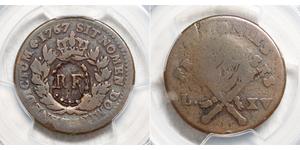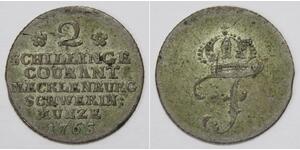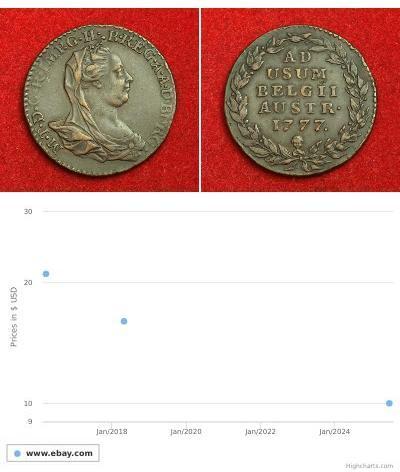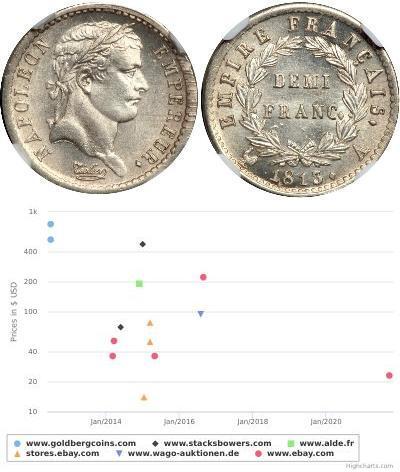[ 3415] Augustus - Roman Emperor: 27 B.C. - 14 A.D. Augustus, with Caius Caesar Bronze (24mm,7.08 gm.), MACEDON. Thessalonica, 5 BC - 10 A.D. Reference: RPC 1564. Rare. Laureate head of Augustus right. Bare head of Caius Caesar right. Provided with certificate of authenticity. CERTIFIED AUTHENTIC by Sergey Nechayev, PhD - Numismatic Expert GAIUS CAESAR Son of Agrippa and Julia Grandson and Intended Heir of Augustus First Husband of Livilla Brother of Lucius Caesar, Agrippa Postumus, Julia the Younger and Agrippina Senior Gaius Caesar, 20 B.C. - A.D. 4. Gaius Caear and his younger brother Lucius Caesar were adopted by their grandfather Augustus in 17 B.C., who personally saw to their education. After his father, Agrippa, died in 12 B.C., Gaius Caesar was hailed princeps iuventutis, as he and Lucius Caesar became the intended successors of Augustus. But the brothers were spoiled and presumptuous about their future roles in government, so in 6 B.C. Augustus tried to teach them some humility by awarding Tiberius the tribunician power for five years. But Tiberius refused the honor since he was fed up with his marriage to Julia and was not anxious to be drawn into conflict with his stepsons Gaius and Lucius. Instead, Tiberius withdrew from public service and exiled himself on the distant island of Rhodes. In the following year Gaius Caesar turned 15, upon which he was designated for the consulship of 1 B.C. and prematurely admitted to the senate. BY all accounts, his public presentation was warmly received. Gaius Caesar's first and only wife was LIvilla, the daughter of Nero Claudius Drusus and Antonia, whom he married in 1 B.C. Livilla is better known for her later marriage to Tiberius' son, Drusus, and for her adulterous affair with the praetorian prefect Sejanus. Though their marriage united the families of Augustus and Livia, it produced no children, and thus did not have the unifying effect their parents might have envisioned. Gaius Caesar attained his first important mission in 1 B.C., when he was sent to the East to direct a campaign against Parthia, which had seized Armenia. Accompanying him as advisers were Sejanus, the future prefect of Tiberius, and Domitius Ahenobarbus, the grandfather of Nero. While in Syria, he celebrated his first consulate, and all seemed to be going well for the young heir to the throne, though the death of his younger brother, Lucius Caesar, in A.D. 2 must have come as a shock. A similar fate, however, was awaiting Gaius Caesar, who near the end of the war in the east suffered a serious that eventually proved fatal (though some suggested Livia may have had a hand in his "natural" death). Gaius Caesar died at Limyra in Lycia in February of A.D. 4 while returning to Rome. His death was a shock not only to his adoptive grandfather, Augustus, but also to the people of Rome, who seem to have been fond of the young man. Once again - for the fourth time - Augustus had lost an heir to the throne. Augustus (Latin: IMPERATOR·CAESAR·DIVI·FILIVS·AVGVSTVS; 23 September 63 BC – 19 August AD 14), born Gaius Octavius Thurinus, was adopted by his great-uncle Julius Caesar in 44 BC, and between then and 27 BC was officially named Gaius Julius Caesar Octavianus. After 27 BC, he was named Gaius Julius Caesar Augustus. Because of the various names he bore, it is common to call him Octavius when referring to events between 63 and 44 BC, Octavian (or Octavianus) when referring to events between 44 and 27 BC, and Augustus when referring to events after 27 BC. He became the first emperor of the Roman Empire, which he ruled alone from 27 BC until his death in AD 14. The young Octavius came into his inheritance after Caesar's assassination in 44 BC. In 43 BC, Octavian joined forces with Mark Antony and Marcus Aemilius Lepidus in a military dictatorship known as the Second Triumvirate. As a triumvir, Octavian ruled Rome and many of its provinces as an autocrat, seizin ...
más ...
Similar Coin Groups

2 Skilling Dinamarca Plata Federico VI d ...
grupo tiene 18 monedas / 18 precios
Add coin to this group
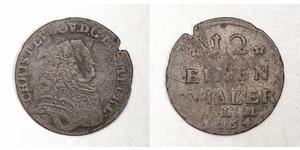
1/12 Thaler Mecklemburgo-Schwerin (1352- ...
grupo tiene 3 monedas / 3 precios
Add coin to this group
2025-05-25
- Historical Coin Prices
2025-05-25
- Historical Coin Prices
1/2 Franc Primer Imperio francés (1804-1814) Plata ...
Precios de moneda de fuentes públicas
Detalles
Usted podría estar interesado en …






